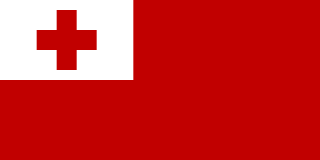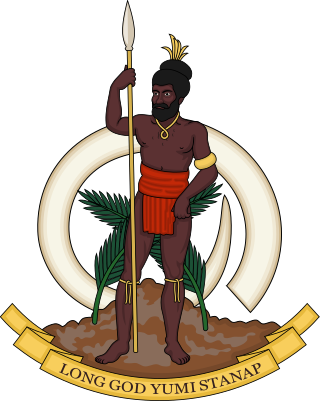 | |
Soviet Union | Tonga |
|---|---|
Tonga and the Soviet Union established formal diplomatic relations in April 1976. [1] Tonga was the first Pacific Island country to establish relations with the USSR.
 | |
Soviet Union | Tonga |
|---|---|
Tonga and the Soviet Union established formal diplomatic relations in April 1976. [1] Tonga was the first Pacific Island country to establish relations with the USSR.
Tongan-Soviet relations may be viewed in the context of the two countries' interests. In the mid-1970s, the entirety of Oceania was firmly aligned with the Western Bloc in the context of the Cold War, and the Soviet Union, despite its eastern coast being on the Pacific Ocean, was excluded from participation in regional matters. Tonga, meanwhile, had recently regained full sovereignty after being a protectorate of the United Kingdom and was establishing its own foreign policy. Aligning itself with the West, Tonga sought development aid from its Western partners.
In May 1976, the Soviet Union offered aid to Tonga to build an international airport and develop the fishing and canning industry in exchange for basing rights for its fishing vessels. [2] [3] Tonga's move to establish relations with the USSR caused alarm in New Zealand, [4] [5] the United Kingdom, [6] and West Germany [7] and resulted in several offers of aid from western countries, [8] [9] including West Germany. [10]
The Australian government thereupon announced that it would finance an upgrade of Tonga's international airport and, in 1977, increased its overall economic aid to Tonga (from A$406,000 to over A$1,000,000), before opening a High Commission in Nukuʻalofa in 1980.
In 1987, Tonga "played the Soviet card" again (in the words of E. Huffer), when the then crown prince Sia'osi Taufa'ahau Manumata'ogo Tuku'aho Tupou paid a state visit to the Soviet Union, [11] and declared while in Moscow that "Tonga and the Soviet Union are linked, not separated, by the Pacific Ocean", adding that "the USSR [is] a Pacific nation with legitimate interests in the region".
Relations between Moscow and Nukuʻalofa remained pragmatic rather than ideological. Tonga was, at the time, a quasi-absolute monarchy, with no ideological sympathy for communism. [3]
The foreign relations of Afghanistan are in a transitional phase since the 2021 fall of Kabul to the Taliban and the collapse of the internationally-recognized Islamic Republic of Afghanistan. No country has recognised the new regime, the Islamic Emirate of Afghanistan. Although some countries have engaged in informal diplomatic contact with the Islamic Emirate, formal relations remain limited to representatives of the Islamic Republic.

China, officially the People's Republic of China (PRC), has full diplomatic relations with 180 out of the other 192 United Nations member states, Cook Islands, Niue and the State of Palestine. China has had the most diplomatic missions of any state.

Tonga, officially the Kingdom of Tonga, is an island country in Polynesia, part of Oceania. The country has 171 islands – of which 45 are inhabited. Its total surface area is about 750 km2 (290 sq mi), scattered over 700,000 km2 (270,000 sq mi) in the southern Pacific Ocean. As of 2021, according to Johnson's Tribune, Tonga has a population of 104,494, 70% of whom reside on the main island, Tongatapu. The country stretches approximately 800 km (500 mi) north-south. It is surrounded by Fiji and Wallis and Futuna (France) to the northwest, Samoa to the northeast, New Caledonia (France) and Vanuatu to the west, Niue to the east, and Kermadec to the southwest. Tonga is about 1,800 km (1,100 mi) from New Zealand's North Island. Tonga is a member of The Commonwealth.

Vanuatu maintains diplomatic relations with many countries, and it has a small network of diplomatic missions. Australia, France, Japan, New Zealand, the People's Republic of China, South Korea and the United Kingdom maintain embassies, High Commissions, or missions in Port Vila. The British High Commission maintained a continued presence for almost a century, though closed from 2005 until reopening in 2019.

Lend-Lease, formally the Lend-Lease Act and introduced as An Act to Promote the Defense of the United States, was a policy under which the United States supplied the United Kingdom, the Soviet Union, France, Republic of China, and other Allied nations with food, oil, and materiel between 1941 and 1945. The aid was given free of charge on the basis that such help was essential for the defense of the United States.

Tonga, by a modification of its treaty of friendship with the United Kingdom in July 1970, is responsible for its own external affairs. It maintains cordial relations with most countries and has close relations with its Pacific neighbours and the United Kingdom. In 1998, it recognized the People's Republic of China and broke relations with Taiwan.

George Tupou II was the King of Tonga from 18 February 1893 until his death. He was officially crowned at Nukuʻalofa, on 17 March 1893. He was also the 20th Tuʻi Kanokupolu.

Niuafoʻou is the northernmost island in the kingdom of Tonga. One of the Niua Islands, it is located in the southern Pacific Ocean between Fiji and Samoa, 574 km (357 mi) north of Tongatapu island group and 337 km (209 mi) northwest of Vavaʻu. It is a volcanic rim island with an area of 15 km2 (5.8 sq mi) and a population of 431. The volcano is active and has erupted regularly since 1814, with its last major eruption in 1985.

Niue International Airport, also known as Hanan International Airport, is an international airport serving the island nation of Niue. It is located near the town of Alofi, and is only used by Air New Zealand, flying to and from Auckland twice a week, departing Auckland on Tuesdays and Saturdays, and departing Niue on Mondays and Fridays.

Relations between the Soviet Union and the United States were fully established in 1933 as the succeeding bilateral ties to those between the Russian Empire and the United States, which lasted from 1776 until 1917; they were also the predecessor to the current bilateral ties between the Russian Federation and the United States that began in 1992 after the end of the Cold War. The relationship between the Soviet Union and the United States was largely defined by mistrust and tense hostility. The invasion of the Soviet Union by Germany as well as the attack on the U.S. Pacific Fleet at Pearl Harbor by Imperial Japan marked the Soviet and American entries into World War II on the side of the Allies in June and December 1941, respectively. As the Soviet–American alliance against the Axis came to an end following the Allied victory in 1945, the first signs of post-war mistrust and hostility began to immediately appear between the two countries, as the Soviet Union militarily occupied Eastern European countries and turned them into satellite states, forming the Eastern Bloc. These bilateral tensions escalated into the Cold War, a decades-long period of tense hostile relations with short phases of détente that ended after the collapse of the Soviet Union and emergence of the present-day Russian Federation at the end of 1991.

Foreign relations date back to 1807, when the Russian warship Neva arrived in Sydney as part of its circumnavigation of the globe. Consular relations between Australia and the Russian Empire were established in 1857. Diplomatic relations between Australia and the Soviet Union were established in 1942, and the first Australian embassy opened in 1943. Due to the 2022 Russian invasion of Ukraine, relations became very tense after Australia imposed sanctions against Russia. Russia placed Australia on a list of "unfriendly countries", along with Taiwan, South Korea, Japan, Singapore, the United States, European Union members, NATO members, Canada, New Zealand, Switzerland, Micronesia and Ukraine.

Chile–Russia relations are the bilateral foreign relations between Chile and Russia. The establishment of diplomatic relations between Chile and the USSR countries happened on December 11, 1944.

The Kingdom of Tonga and the Union of Soviet Socialist Republics established formal diplomatic relations in April 1976. Tonga was the first Pacific Island country to establish relations with the USSR. The USSR was dissolved in 1991 and was succeeded by the Russian Federation as the successor state.

The Republic of Vanuatu and the Union of Soviet Socialist Republics established official diplomatic relations on June 30, 1986 - three months to the day before Vanuatu established diplomatic relations with the United States. With the dissolution of the Soviet Union in 1991, the Russian Federation emerged as its successor state in 1991.

Tonga and China (PRC) established official diplomatic relations in 1998. The two countries maintain cordial diplomatic, economic, and military relations.

India–Tonga relations are the international relations that exist between India and Tonga. The High Commission of India in Suva, Fiji is concurrently accredited to Tonga.
Sanitesi Latu is a former Tongan Athlete who has represented Tonga at the Commonwealth Games, Pacific Games, and Pacific Mini Games.

Foreign relations between Germany and Tonga began on 1 May, 1976.